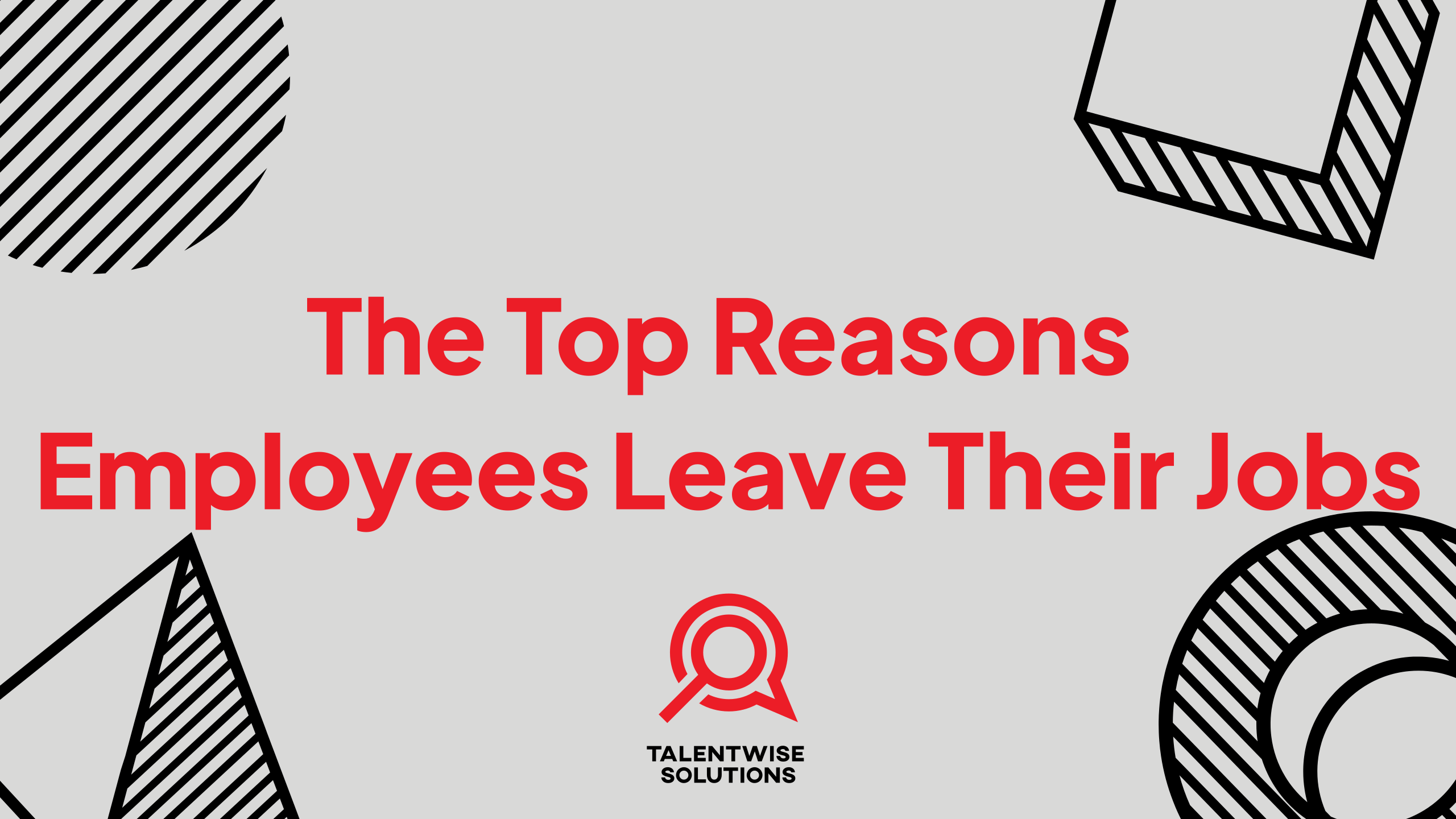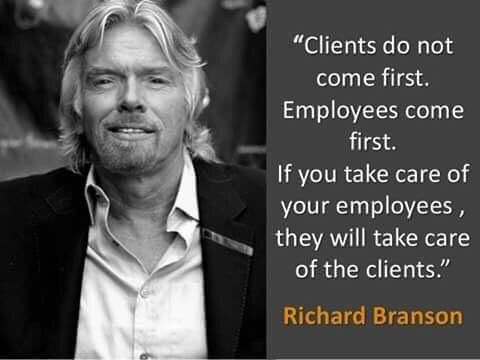
Written by Katie Doolan - Lead Recruitment Associate
As recruiters, we speak with people every single day who have either just left their jobs or are looking to leave their current job and find something new.
We tend to hear the same reasons over and over from people about why they felt it was time to move on from their employer, so we have looked at the top reasons from the last 12 months and thought it would be useful to share the top reasons employees give for leaving their jobs with you.
If you’re an employer, read on to find out how you might be able to improve your retention levels and prevent your top talent from leaving you. If you’re an employee who might be thinking about leaving your current role, read on to see if any of the below resonates with you.
The Work Environment & Culture
Sadly, we hear the word ‘toxic’ all the time when speaking with employees about why they are looking to leave their current role. How do you know if your workplace is toxic? If there is a high turnover of staff, staff morale is generally low, and negativity is rife, then it’s likely the culture at your workplace is toxic.
We have heard so many stories from candidates of micromanagement, being shouted at in front of their colleagues, workplace bullying and negativity. We have also heard of staff being expected to work well above and beyond their contracted hours to get work finished due to firms being understaffed which created a culture where everyone was tired, stressed and burnt out – not the best environment to work in!
You also can’t underestimate the importance of employee recognition, with a lot of employees giving lack of recognition as a huge reason for them being demotivated at work.
How can employers prevent this? – As a leader, you need to be mindful that you set the tone and the culture of your organisation, and it’s so important to lead by example. For example, if your employees feel you are creating strict rules for them, but not following these rules yourself, it can lead to bitterness and resentment. It’s also important that employees feel they can share concerns with management without fear. You can assure your employees that all feedback will be listened to and addressed, and you could even offer some kind of incentive for sharing their ideas that could improve the workplace.
It’s also vital that you don’t treat some employees differently than others, and don’t have ‘favourites’ who get special treatment. This only creates tension amongst employees and demotivates other staff members.
In terms of providing employee recognition, from reward and recognition programmes to a simple thank you for job well done, there are many ways to show that you value and appreciate your employees. This goes a long way!
Make sure employees know that you don’t expect them to work above and beyond their working hours, and again, lead by example by maintaining a healthy level of work life balance yourself!
Higher Salary & Better Benefits Package
So many of the candidates we speak with say they are looking to leave their jobs because they want more money or better benefits. The first question we always ask when they say this is “have you spoken with your employer about this?”. A lot of the time the candidate will say they haven’t, so we advise them to go and do this first before looking for a new role.
However, most of the time, employers do not offer a salary increase until after an employee has handed their notice in and accepted another role elsewhere. By this time, it is often too late and the employee will leave no matter what you offer them as they don’t feel that you valued them enough to pay them what they were worth until they handed in their notice.
A lack of employee benefits is also a common reason that candidates give for wanting to leave their roles. Annual leave offering, free parking, and many other benefits can all vary massively from firm to firm and these things matter to employees.
How can employers prevent this? – This can be prevented by being pro-active around employee salaries and benefits. With inflation and the cost-of-living increasing year on year, the organisations who are carrying out salary and benefits benchmarking regularly and pro-actively ensuring their teams are paid fairly are the ones who will have the best retention. If you are still paying your members of staff the same salary as when they started at your company five years ago, then don’t be surprised when they leave for a new role with a higher salary and better benefits package.
Lack of Career Progression & Development
Another one of the top reasons people cited for wanting to move on from their job was a lack of any kind of progression or development in their role. They felt like the job had become ‘stagnant’ and they weren’t learning any kind of new skills in their role. This led to them feeling bored and directionless, and on the lookout for opportunities where they felt they could progress their career and develop themselves.
How can employers prevent this? – The clients that we work with who have the best retention of staff prioritise a huge focus on staff development. The firms with the best retention are firms where all staff have monthly 121’s with their manager to discuss their career and development, where there is a clear career pathway upon joining, where there are annual salary reviews, performance bonuses, and where employers support staff to undertake qualifications. Some employees of course may not want to progress or take on any extra learning, but it is important that you are regularly checking in with all employees so that you know what is important to them to be happy at work.

Lack of Flexibility / Remote Working
This is a huge reason we have seem come up for people wanting to leave their current employer, especially over the past few years. One of the effects of the Covid pandemic is that it made people reassess what was important to them and gave people a taste of a different kind of life. One without daily long commutes, without missing dinners with their families due to travel time and with the flexibility to drop their kids off at school.
So many people that we speak with now won’t even consider a role where they cannot work from home at least 2 days per week.
How can employers prevent this? – If you are not offering any level of flexibility around hours, and you will not budge on all staff having to come into the office 5 days per week, it’s important to regularly review this and ask yourself why. Is it actually integral to the role that all staff must be in from 9am until 5pm every day, or are you just reluctant to change things because it’s ‘the way it’s always been’?
Of course, there are certain jobs which cannot be done from home, but there are many that can. Not only that, but a study done by internet provider, Talk Talk, showed that more than half of employees are actually more productive when they work from home.
It’s worth investing in better technology to enable employees to work remotely, looking at your policies around flexible and remote working, and doing all you can to make your workplace as flexible as possible, otherwise you could end up losing your best employees, and struggling to attract talent too.
Conclusion
There are several other reasons for employees leaving roles that employers are never going to be able to control, for example, they are relocating, they are retiring, or they are going travelling. However, the reasons given above are by far the most common reasons that we hear, and they are all within the employer’s control.
A lot of our lives are spent at work, and employees want to work somewhere with a positive and happy culture. They want to feel respected and valued for the work that they do, and they want to feel supported.
Never leave it until after the employee hands in their notice to address the above points, as it will likely be too late. You need to be pro-active and ensure that you are treating your employees well, because if you don’t, there are plenty of firms out there who will.
If you have any questions on any of the information in this article, or if you’d like to see how we Talentwise Solutions can support you with either a job vacancy, or with your own job search, please do get in touch. We’re always happy to chat!
02477 981223 / admin@talentwisesolutions.co.uk


